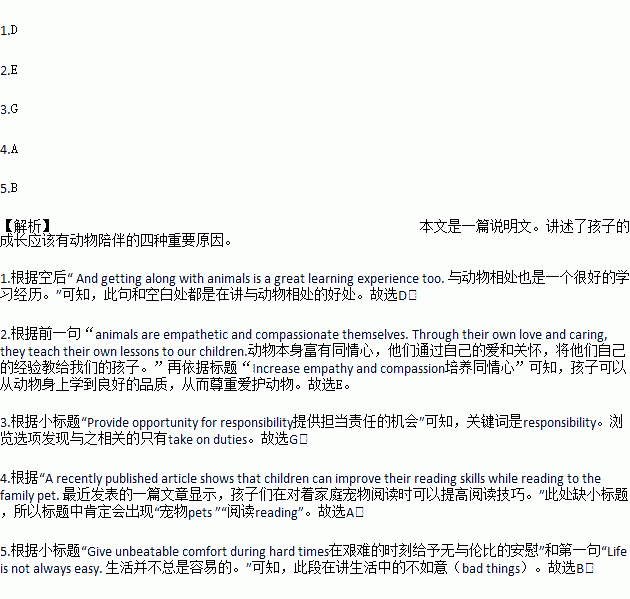题目内容
4 Important Reasons to Raise Your Children Around Animals
http://www.onegreenplanet.org/animalsandnature/why-it-is-important-to-raise-kids-around-animals/
If you have a love for animals, chances are that you want your children to have that love too. 1. And getting along with animals is a great learning experience too. Starting that kind of bond with animals while your children are young is really important for many reasons and here are just some of them.
1. Increase empathy (移情) and compassion(同情心)
Children that are raised around animals are more likely to develop good qualities. They are learning to care about something with positive attention and responsibility. Additionally, animals are empathetic and compassionate themselves. Through their own love and caring, they teach their own lessons to our children.2.
2. Provide opportunity for responsibility
As children grow up with an animal, they learn to be more responsible. 3. They can help feed the fish or walk the family dog.
3. 4.
A recently published article shows that children can improve their reading skills while reading to the family pet. This might be because animals are such patient and kind creatures that help lower stress.
4. Give unbeatable comfort during hard times
Life is not always easy. 5. When there is a family pet, that pet is always there for the family to offer comfort. That pet keeps his company when your child feels lonely. Sometimes it is that silent hug and constant companionship that make children feel alright again with the stresses that come into their lives.
A. Pets increase reading success
B. Sometimes bad things happen.
C. Some people are cruel to animals.
D. Animals are great friends to people of all ages.
E. This way children will learn to respect animals.
F. Hopefully, you can feel pity for the homeless animals.
G. They must take on duties in order to care for that animal.
 全能练考卷系列答案
全能练考卷系列答案 一课一练课时达标系列答案
一课一练课时达标系列答案假如你是李华,最近你们学校倡议开展“读书月活动”。请根据提示,写信给《中国教育报》,谈谈你校“读书月活动”的事。“看法”可适当发挥。开头已给出。词数:100左右。
学校的倡议 | 你对读书月的看法 |
1.宣布5月4日至6月4日为全校“读书活动月”; 2.号召全校同学多读书,读好书 | 1.获取知识,充实自我; 2.远离网吧,健康成长; 3.读书是一种乐趣 |
Dear Editor,
I’m writing to tell you about “Reading Month” activity in our school. Recently
_________________________________________________________________________________
_________________________________________________________________________________
_________________________________________________________________________________
_________________________________________________________________________________
_________________________________________________________________________________
_________________________________________________________________________________
_________________________________________________________________________________
_______________________________________________________
Yours,
Li Hua


